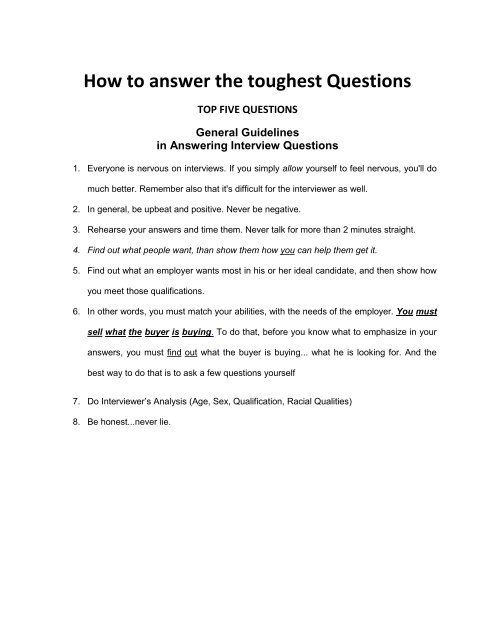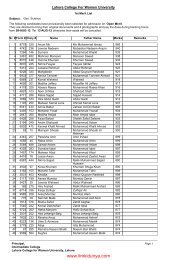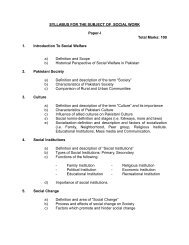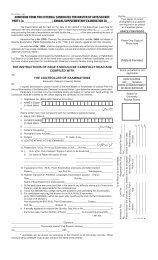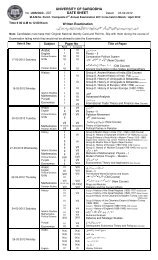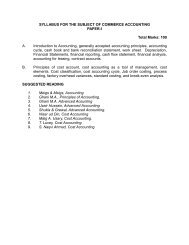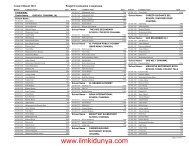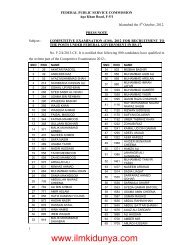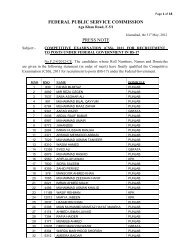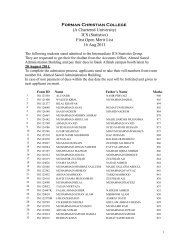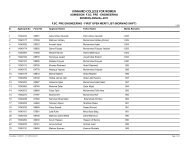How to answer the toughest Questions - ilmkidunya
How to answer the toughest Questions - ilmkidunya
How to answer the toughest Questions - ilmkidunya
- No tags were found...
You also want an ePaper? Increase the reach of your titles
YUMPU automatically turns print PDFs into web optimized ePapers that Google loves.
<strong>How</strong> <strong>to</strong> <strong>answer</strong> <strong>the</strong> <strong>to</strong>ughest <strong>Questions</strong>TOP FIVE QUESTIONSGeneral Guidelinesin Answering Interview <strong>Questions</strong>1. Everyone is nervous on interviews. If you simply allow yourself <strong>to</strong> feel nervous, you'll domuch better. Remember also that it's difficult for <strong>the</strong> interviewer as well.2. In general, be upbeat and positive. Never be negative.3. Rehearse your <strong>answer</strong>s and time <strong>the</strong>m. Never talk for more than 2 minutes straight.4. Find out what people want, than show <strong>the</strong>m how you can help <strong>the</strong>m get it.5. Find out what an employer wants most in his or her ideal candidate, and <strong>the</strong>n show howyou meet those qualifications.6. In o<strong>the</strong>r words, you must match your abilities, with <strong>the</strong> needs of <strong>the</strong> employer. You mustsell what <strong>the</strong> buyer is buying. To do that, before you know what <strong>to</strong> emphasize in your<strong>answer</strong>s, you must find out what <strong>the</strong> buyer is buying... what he is looking for. And <strong>the</strong>best way <strong>to</strong> do that is <strong>to</strong> ask a few questions yourself7. Do Interviewer’s Analysis (Age, Sex, Qualification, Racial Qualities)8. Be honest...never lie.
Question 1Tell me about yourself.TRAPS: Beware, about 80% of all interviews begin with this “innocent” question. Manycandidates, unprepared for <strong>the</strong> question, skewer <strong>the</strong>mselves by rambling, recapping <strong>the</strong>ir lifes<strong>to</strong>ry, delving in<strong>to</strong> ancient work his<strong>to</strong>ry or personal matters.BEST ANSWER: Start with <strong>the</strong> present and tell why you are well qualified for <strong>the</strong> position.Remember that <strong>the</strong> key <strong>to</strong> all successful interviewing is <strong>to</strong> match your qualifications <strong>to</strong> what <strong>the</strong>interviewer is looking for. In o<strong>the</strong>r words you must sell what <strong>the</strong> buyer is buying. This is <strong>the</strong>single most important strategy in job hunting.So, before you <strong>answer</strong> this or any question it's imperative that you try <strong>to</strong> uncover yourinterviewer's greatest need, want, problem or goal.To do so, make you take <strong>the</strong>se two steps:1. Do all <strong>the</strong> homework you can before <strong>the</strong> interview <strong>to</strong> uncover this person's wants andneeds (not <strong>the</strong> generalized needs of <strong>the</strong> industry or company)2. As early as you can in <strong>the</strong> interview, ask for a more complete description of what <strong>the</strong>position entails. You might say: “I have a number of accomplishments I'd like <strong>to</strong> tell youabout, but I want <strong>to</strong> make <strong>the</strong> best use of our time <strong>to</strong>ge<strong>the</strong>r and talk directly <strong>to</strong> yourneeds. To help me do, that, could you tell me more about <strong>the</strong> most important priorities ofthis position? All I know is what I (heard from <strong>the</strong> recruiter, read in <strong>the</strong> classified ad,etc.)”Then, ALWAYS follow-up with a second and possibly, third question, <strong>to</strong> draw out his needseven more. Surprisingly, it's usually this second or third question that unearths what <strong>the</strong>interviewer is most looking for.You might ask simply, "And in addition <strong>to</strong> that?..." or, "Is <strong>the</strong>re anything else you see asessential <strong>to</strong> success in this position?:This process will not feel easy or natural at first, because it is easier simply <strong>to</strong> <strong>answer</strong> questions,but only if you uncover <strong>the</strong> employer's wants and needs will your <strong>answer</strong>s make <strong>the</strong> most sense.Practice asking <strong>the</strong>se key questions before giving your <strong>answer</strong>s, <strong>the</strong> process will feel morenatural and you will be light years ahead of <strong>the</strong> o<strong>the</strong>r job candidates you're competing with.After uncovering what <strong>the</strong> employer is looking for, describe why <strong>the</strong> needs of this job bearstriking parallels <strong>to</strong> tasks you've succeeded at before. Be sure <strong>to</strong> illustrate with specificexamples of your responsibilities and especially your achievements, all of which are geared <strong>to</strong>present yourself as a perfect match for <strong>the</strong> needs he has just described.
Question 2What are your greatest strengths?TRAPS: This question seems like a softball lob, but be prepared. You don't want <strong>to</strong> comeacross as egotistical or arrogant. Nei<strong>the</strong>r is this a time <strong>to</strong> be humble.BEST ANSWER: You know that your key strategy is <strong>to</strong> first uncover your interviewer's greatestwants and needs before you <strong>answer</strong> questions. And from Question 1, you know how <strong>to</strong> do this.Prior <strong>to</strong> any interview, you should have a list mentally prepared of your greatest strengths. Youshould also have, a specific example or two, which illustrates each strength, an example chosenfrom your most recent and most impressive achievements.You should, have this list of your greatest strengths and corresponding examples from yourachievements so well committed <strong>to</strong> memory that you can recite <strong>the</strong>m cold after being shakenawake at 2:30AM.Then, once you uncover your interviewer's greatest wants and needs, you can choose thoseachievements from your list that best match up.As a general guideline, <strong>the</strong> 10 most desirable traits that all employers love <strong>to</strong> see in <strong>the</strong>iremployees are:1. A proven track record as an achiever...especially if your achievements match up with<strong>the</strong> employer's greatest wants and needs.2. Intelligence...management "savvy".3. Honesty...integrity...a decent human being.4. Good fit with corporate culture...someone <strong>to</strong> feel comfortable with...a team playerwho meshes well with interviewer's team.5. Likeability...positive attitude...sense of humor.6. Good communication skills.7. Dedication...willingness <strong>to</strong> walk <strong>the</strong> extra mile <strong>to</strong> achieve excellence.8. Definiteness of purpose...clear goals.9. Enthusiasm...high level of motivation.10. Confident...healthy...a leader.Question 3What are your greatest weaknesses?TRAPS: Beware - this is an elimina<strong>to</strong>r question, designed <strong>to</strong> shorten <strong>the</strong> candidate list. Anyadmission of a weakness or fault will earn you an “A” for honesty, but an “F” for <strong>the</strong> interview.PASSABLE ANSWER: Disguise a strength as a weakness.Example: “I sometimes push my people <strong>to</strong>o hard. I like <strong>to</strong> work with a sense of urgency andeveryone is not always on <strong>the</strong> same wavelength.”
Drawback: This strategy is better than admitting a flaw, but it's so widely used, it is transparent<strong>to</strong> any experienced interviewer.BEST ANSWER: (and ano<strong>the</strong>r reason it's so important <strong>to</strong> get a thorough description of yourinterviewer's needs before you <strong>answer</strong> questions): Assure <strong>the</strong> interviewer that you can think ofnothing that would stand in <strong>the</strong> way of your performing in this position with excellence. Then,quickly review you strongest qualifications.Example: “Nobody's perfect, but based on what you've <strong>to</strong>ld me about this position, I believe I' dmake an outstanding match. I know that when I hire people, I look for two things most of all. Do<strong>the</strong>y have <strong>the</strong> qualifications <strong>to</strong> do <strong>the</strong> job well, and <strong>the</strong> motivation <strong>to</strong> do it well? Everything in mybackground shows I have both <strong>the</strong> qualifications and a strong desire <strong>to</strong> achieve excellence inwhatever I take on. So I can say in all honesty that I see nothing that would cause you even asmall concern about my ability or my strong desire <strong>to</strong> perform this job with excellence.”Alternate strategy (if you don't yet know enough about <strong>the</strong> position <strong>to</strong> talk about such a perfectfit):Instead of confessing a weakness, describe what you like most and like least, making sure thatwhat you like most matches up with <strong>the</strong> most important qualification for success in <strong>the</strong> position,and what you like least is not essential.Example: Let's say you're applying for a teaching position. “If given a choice, I like <strong>to</strong> spend asmuch time as possible in front of my prospects selling, as opposed <strong>to</strong> shuffling paperwork backat <strong>the</strong> office. Of course, I long ago learned <strong>the</strong> importance of filing paperwork properly, and I doit conscientiously. But what I really love <strong>to</strong> do is sell (if your interviewer were a sales manager,this should be music <strong>to</strong> his ears.)Question 4Tell me about something you did – or failed <strong>to</strong> do – that younow feel a little ashamed of.TRAPS: There are some questions your interviewer has no business asking, and this is one.But while you may feel like <strong>answer</strong>ing, “none of your business,” naturally you can’t. Someinterviewers ask this question on <strong>the</strong> chance you admit <strong>to</strong> something, but if not, at least <strong>the</strong>y’llsee how you think on your feet.Some unprepared candidates, flustered by this question, unburden <strong>the</strong>mselves of guilt from<strong>the</strong>ir personal life or career, perhaps expressing regrets regarding a parent, spouse, child, etc.All such <strong>answer</strong>s can be disastrous.BEST ANSWER: As with faults and weaknesses, never confess a regret. But don’t seem as ifyou’re s<strong>to</strong>newalling ei<strong>the</strong>r.Best strategy: Say you harbor no regrets, <strong>the</strong>n add a principle or habit you practice regularly forhealthy human relations.
Example: Pause for reflection, as if <strong>the</strong> question never occurred <strong>to</strong> you. Then say, “You know, Ireally can’t think of anything.” (Pause again, <strong>the</strong>n add): “I would add that as a generalmanagement principle, I’ve found that <strong>the</strong> best way <strong>to</strong> avoid regrets is <strong>to</strong> avoid causing <strong>the</strong>m in<strong>the</strong> first place. I practice one habit that helps me a great deal in this regard. At <strong>the</strong> end of eachday, I mentally review <strong>the</strong> day’s events and conversations <strong>to</strong> take a second look at <strong>the</strong> peopleand developments I’m involved with and do a doublecheck of what <strong>the</strong>y’re likely <strong>to</strong> be feeling.Sometimes I’ll see things that do need more follow-up, whe<strong>the</strong>r a pat on <strong>the</strong> back, or maybe afive minute chat in someone’s office <strong>to</strong> make sure we’re clear on things…whatever.”“I also like <strong>to</strong> make each person feel like a member of an elite team, like <strong>the</strong> Bos<strong>to</strong>n Celtics orLA Lakers in <strong>the</strong>ir prime. I’ve found that if you let each team member know you expectexcellence in <strong>the</strong>ir performance…if you work hard <strong>to</strong> set an example yourself…and if you letpeople know you appreciate and respect <strong>the</strong>ir feelings, you wind up with a highly motivatedgroup, a team that’s having fun at work because <strong>the</strong>y’re striving for excellence ra<strong>the</strong>r thanbrooding over slights or regrets.”Question 5Why are you leaving (or did you leave) this position?TRAPS: Never badmouth your previous industry, company, board, boss, staff, employees orcus<strong>to</strong>mers. This rule is inviolable: never be negative. Any mud you hurl will only soil your suit.Especially avoid words like “personality clash”, “didn’t get along”, or o<strong>the</strong>rs which cast a shadowon your competence, integrity, or temperament.BEST ANSWER:(If you have a job presently)If you’re not yet 100% committed <strong>to</strong> leaving your present post, don’t be afraid <strong>to</strong> say so. Sinceyou have a job, you are in a stronger position than someone who does not. But don’t be coyei<strong>the</strong>r. State honestly what you’d be hoping <strong>to</strong> find in a new spot. Of course, as stated oftenbefore, you <strong>answer</strong> will all <strong>the</strong> stronger if you have already uncovered what this position is allabout and you match your desires <strong>to</strong> it.(If you do not presently have a job.)Never lie about having been fired. It’s unethical – and <strong>to</strong>o easily checked. But do try <strong>to</strong> deflect<strong>the</strong> reason from you personally. If your firing was <strong>the</strong> result of a takeover, merger, division widelayoff, etc., so much <strong>the</strong> better.But you should also do something <strong>to</strong>tally unnatural that will demonstrate consummateprofessionalism. Even if it hurts , describe your own firing – candidly, succinctly and without atrace of bitterness – from <strong>the</strong> company’s point-of-view, indicating that you could understand whyit happened and you might have made <strong>the</strong> same decision yourself.
Your stature will rise immensely and, most important of all, you will show you are healed from<strong>the</strong> wounds inflicted by <strong>the</strong> firing. You will enhance your image as first-class managementmaterial and stand head and shoulders above <strong>the</strong> legions of firing victims who, at <strong>the</strong> slightestprovocation, zip open <strong>the</strong>ir shirts <strong>to</strong> expose <strong>the</strong>ir battle scars and decry <strong>the</strong> unfairness of it all.For all prior positions:Make sure you’ve prepared a brief reason for leaving. Best reasons: more money, opportunity,responsibility or growth.ABDUL SHAKOOR MUGHAL


